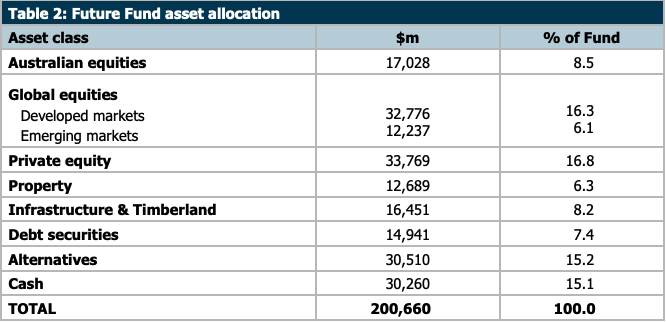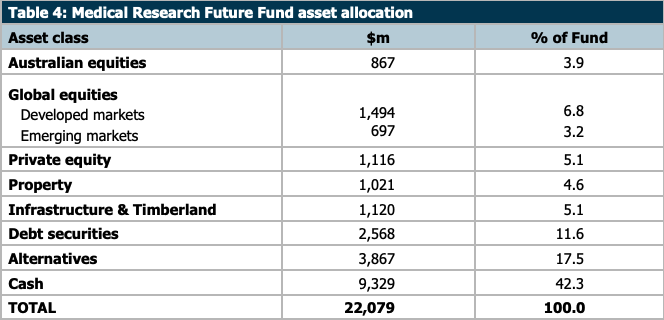Cash is king: Australia's Future Fund retreats out of Russia, risk assets
Everyone is finding it harder to make money - professionals, retail traders, and, as it turns out, the Future Fund. Australia's sovereign wealth fund posted its first three-month negative return since the pandemic began. The result was dragged down primarily by the sharp downturn in global equities and a loss-taking exercise in the fund's Russian assets.
Chairman Peter Costello says this wind-down will continue as market conditions (and for that matter, the Russian government) allow.
Costello also had some brutal words for those who were expecting the easy money to keep flowing like beers at a pub:
As central banks tighten monetary policy to rein in inflation and geopolitical tensions continue to create shocks in investment markets, we have been positioning for what will be a challenging and volatile future. As we have been saying for some time, investors should expect lower returns than in the past over the long term.
In spite of the last three months' losses, the fund's return is still above 10% over the last decade. So what's changed?
Breaking it all down

The break down in the Future Fund's asset allocation philosophy is incredibly fascinating. Although Australian equities relatively outperformed global peers (thanks to an insatiable demand for our commodities), local exposure still remains under 10%.
Also in the equities space, the take-out from Russian assets impacted the fund's overall exposure to emerging markets. Developed market equity exposure continues to remain one of the larger single portions of the fund with nearly $33b allocated. Unfortunately for that exposure, global equity valuations also fell more than eight percent in the last quarter as investors repositioned their stakes in light of higher inflation and interest rates.
Finally, and worthy to note, private equity now makes up a larger position than developed market equities. Does that suggest the analysts think buyouts and venture capital will be the "skill-based" asset they are looking for?
Risk off the table
The biggest move from last quarter appears to be a shift out of listed entities into private equivalents. CEO Raphael Arndt noted additions to the fund's exposure to alternative assets - which now make up 15% of the portfolio. Interestingly, that proportion is the same as the fund's cash holding which may go some way to explaining this quote from Arndt.
The portfolio is positioned moderately below a neutral risk setting. We are maintaining our discipline to only take on risk where the potential rewards justify it.
As already mentioned, Dr Arndt has placed a new emphasis on the kinds of investments they are after - namely "less liquid and more skill-based" assets. According to the Future Fund's website, the context for skill-based returns is in that alternatives space - where "absolute return strategies and other risk premia provide a diversity of return streams".
It's clear that the Future Fund team believes the easy money has been made in these volatile markets - and given equity markets are starting to wake up to the reality of peak inflation, their push into alternatives probably has some merit.
Cash is king
While the Future Fund is the flagship investment, the organisation also takes care of a range of other investments including medical research, drought prevention, and emergency response. A dig deeper into these numbers reveals one glaring feature.
Cash is king
The Medical Research Fund alone has more than 40% of its weighting in cash, more than double its nearest biggest weighting (alternatives at 17%), and multiples of its exposure to Australian equities.

Cash is also the largest weighting of the Aboriginal and Torres Strait Islander Land and Sea Fund, though the gap between it and other exposures is far smaller than its medical counterpart. This same pattern can be seen in the other major funds which the organisation manages.
What now?
The Future Fund's update did not provide much in terms of a concrete outlook for its assets or the subcomponents within its portfolio. It will be incredibly interesting to see how the Fund does in this current quarter given we have rate hikes happening all around the world, inflation continuing not to come down (for the meantime) and selloffs in both the bond and equity markets gaining more traction.
Maybe the smart money isn't easily accessible anymore after all.
Never miss an insight
If you're not an existing Livewire subscriber you can sign up to get free access to investment ideas and strategies from Australia's leading investors.
I'll be in charge of asking the questions to Australia's best macro strategists, economists, and fixed income fund managers. If you have questions of your own or guests we should chat to, flick us an email: content@livewiremarkets.com
3 topics

